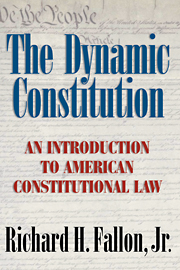Book contents
- Frontmatter
- Contents
- Preface
- Prologue: Bush v. Gore
- Introduction: The Dynamic Constitution
- Part I Individual Rights Under the Constitution
- Part II The Constitutional Separation of Powers
- 7 The Powers of Congress
- 8 Executive Power
- 9 Judicial Power
- Part III Further Issues of Constitutional Structure and Individual Rights
- Appendix: The Constitution of the United States
- Notes
- Index
8 - Executive Power
Published online by Cambridge University Press: 25 July 2009
- Frontmatter
- Contents
- Preface
- Prologue: Bush v. Gore
- Introduction: The Dynamic Constitution
- Part I Individual Rights Under the Constitution
- Part II The Constitutional Separation of Powers
- 7 The Powers of Congress
- 8 Executive Power
- 9 Judicial Power
- Part III Further Issues of Constitutional Structure and Individual Rights
- Appendix: The Constitution of the United States
- Notes
- Index
Summary
Energy in the Executive is a leading character in the definition of good government. It is essential to the protection of the community against foreign attacks; it is not less essential to the steady administration of the laws.
– The Federalist No. 70Over the sweep of american history, power has almost steadily flowed to the President. Congress is a large, often divided, institution. All members must seek election by themselves. All have constituencies to which and for which they attempt to speak. By contrast, the Executive Branch is headed by a single President of the United States, who is much more capable of decisive and accountable leadership. As such leadership has seemed increasingly important, the President has accumulated responsibility to provide it, typically with the acquiescence of Congress and the courts.
These developments have not occurred in defiance of the Constitution, at least when the Constitution is understood in the way that John Marshall, author of Marbury v. Madison (1803), once commended – as “intended to endure for ages to come, and consequently, to be adapted to the various crises of human affairs.” But when adaptation is the order of the day, no firm guides exist as to which elements of the constitutional text should be read strictly and which loosely. When Congress and the President have concurred that the President needs to exercise a power, the courts have most often deferred to that judgment.
- Type
- Chapter
- Information
- The Dynamic ConstitutionAn Introduction to American Constitutional Law, pp. 173 - 188Publisher: Cambridge University PressPrint publication year: 2004



